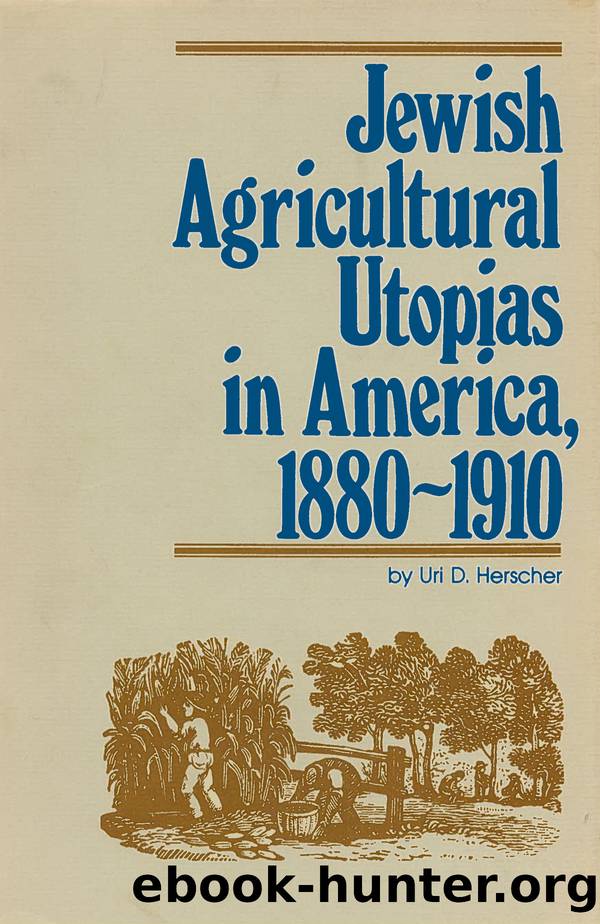Jewish Agricultural Utopias in America, 1880-1910 by Herscher Uri D;

Author:Herscher, Uri D;
Language: eng
Format: epub
Publisher: Wayne State University Press
Published: 2017-06-02T00:00:00+00:00
Gabriel Davidson, director of the Jewish Agricultural Society and chronicler of American Jewish agrarianism. (Courtesy AJA, Cincinnati)
In conclusion, as Ruppin said, âit is noteworthy, that whenever these principles have not been followed either because of exceptional circumstances or undue haste the settlement has suffered.â Of course, some three decades after the establishment of a sovereign Jewish state in the Land of Israel, the kibbutzim which have succeeded have done so as agro-industrial, not exclusively agricultural, enterprises. Even so, significant as the kibbutzim are in Israeli life and in the Israeli economy, no more than 3 percent of the stateâs entire population is made up of kibbutz members. In mid- and late twentieth-century Israel, as in late nineteenth- and early twentieth-century America, urbanization has been the norm. 28
Clearly, the principles adopted by the World Zionist Organization, principles of which Ruppin spoke in the early 1900s, had not been followed, at any rate, not consistently or systematically, in the American Jewish colonization schemes. Yet the thought remains that the attempts at American Jewish colonization were among the factors which helped pave the way for the success of one of the most significant movements in twentieth-century Jewish life: the agricultural-industrial communes which have been so basic to the survival of the Zionist experiment and of the âHebrew renaissanceâ in the Land of Israel.
On a deeper level, both experiences, that of Jewish agricultural colonists in turn-of-the-century North America and that of the chalutzim in Palestine during the closing decades of Ottoman rule, constitute one and the same phenomenon. Both testify to a utopian quest, a messianic urgency, which captured the imagination and guided the energies of not a few, if never anything approaching a sizable minority, of the Russian czarâs Jewish subjects. An observation by the Marxist historian Isaac Deutscher on what motivated the revolutionary zeal of early converts to Soviet communism serves as a summation of Jewish agrarian utopias, too: they had all felt âthe miseries of the old capitalist order to be unbearableâ and had all known âexperience of social injustice or degradation; a sense of insecurity bred by slumps and social crisesâ; and âthe craving for a great ideal or purpose, or for a reliable intellectual guide through the shaky labyrinth of modern society.â29 This is the skeletal fact which stood at the base of impulses to cultivate the wilderness, whether in Oregon, in Kansas, in New Jersey, in Patagonia, or in the Valley of Jezreel.
Download
This site does not store any files on its server. We only index and link to content provided by other sites. Please contact the content providers to delete copyright contents if any and email us, we'll remove relevant links or contents immediately.
Craft Beer for the Homebrewer by Michael Agnew(17933)
Marijuana Grower's Handbook by Ed Rosenthal(3511)
Barkskins by Annie Proulx(3191)
Project Animal Farm: An Accidental Journey into the Secret World of Farming and the Truth About Our Food by Sonia Faruqi(3018)
Red Famine: Stalin's War on Ukraine by Anne Applebaum(2816)
The Plant Messiah by Carlos Magdalena(2745)
0041152001443424520 .pdf by Unknown(2592)
Organic Mushroom Farming and Mycoremediation by Tradd Cotter(2565)
In the Woods by Tana French(2409)
Beer is proof God loves us by Charles W. Bamforth(2249)
7-14 Days by Noah Waters(2247)
The Art of Making Gelato by Morgan Morano(2159)
Meathooked by Marta Zaraska(2144)
Reservoir 13 by Jon McGregor(2143)
Birds, Beasts and Relatives by Gerald Durrell(2135)
Borders by unknow(2116)
The 7 Habits of Highly Effective People: Powerful Lessons in Personal Change (25th Anniversary Edition) by Covey Stephen R(2080)
Between Two Fires by Christopher Buehlman(2033)
The Lean Farm Guide to Growing Vegetables: More In-Depth Lean Techniques for Efficient Organic Production by Ben Hartman(2010)
